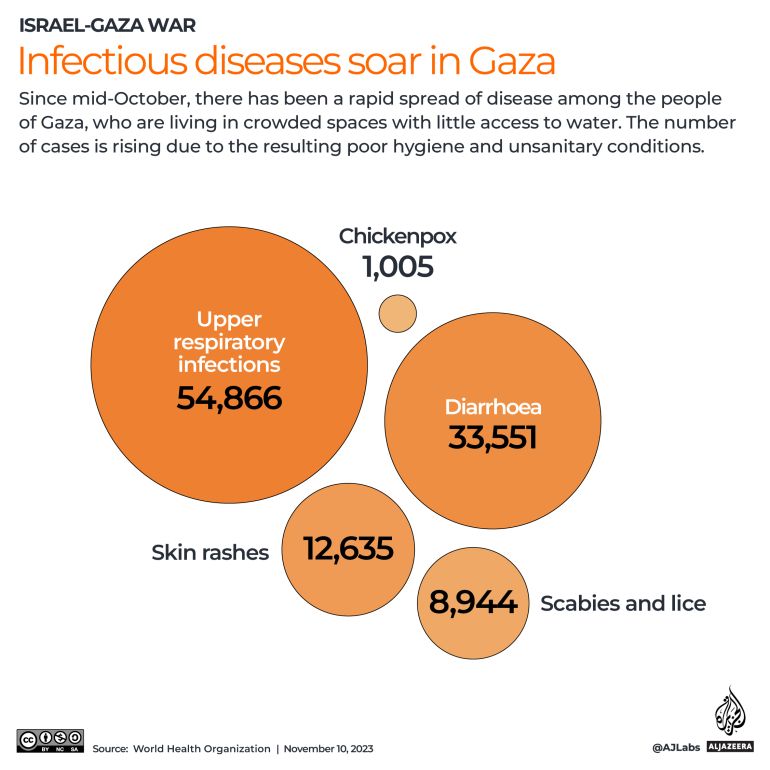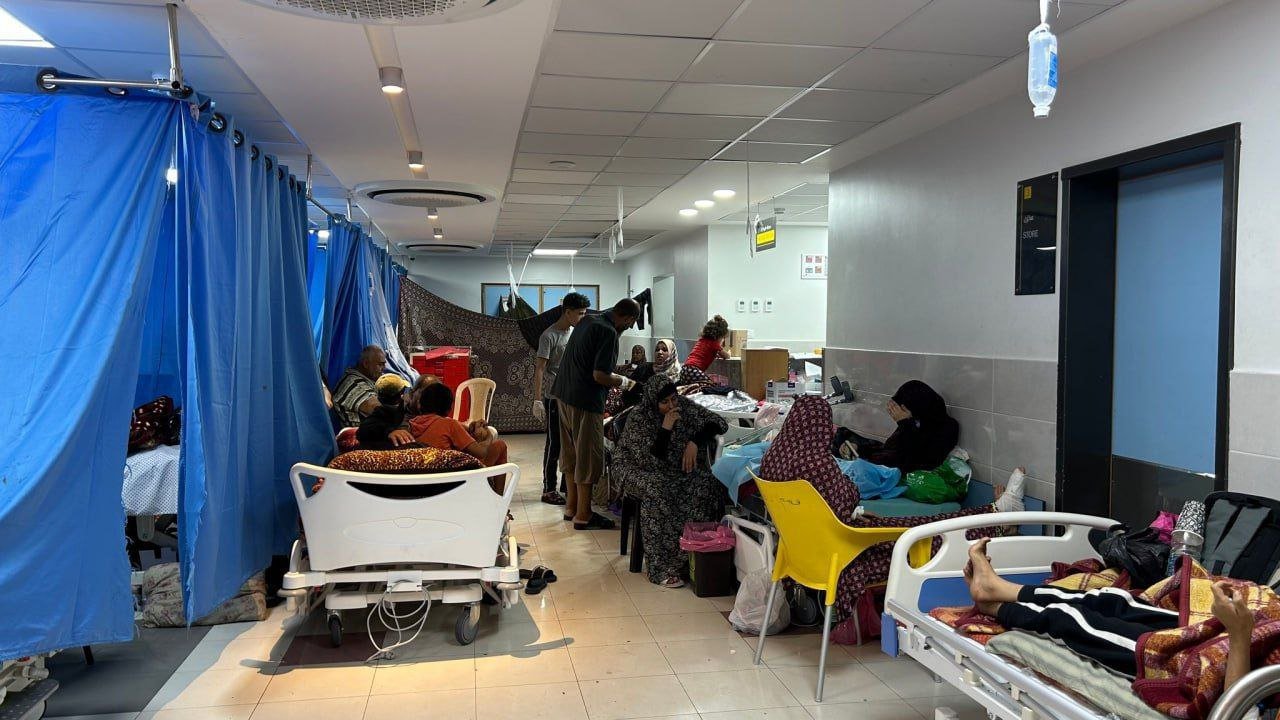Sun 12 October 2023:
Infectious maladies such as diarrhoea and chickenpox are soaring in Gaza, the WHO reported on Wednesday, while medical organisations have been warning of the risk of cholera and epidemics.
Inside Al-Shifa Hospital in Gaza, whose surroundings are subjected to intense and repeated Israeli bombing.
Additionally, Gaza’s water and sanitation crises have made residents unable to escape the ripple effects of Israeli strikes and sieges in their daily lives. A lack of clean drinking water and pollutants proliferating through waterways after infrastructure breakdowns have contributed to infections.
Faced with such limitations, hundreds of thousands of people in Gaza are also cramped into shelters, potentially accelerating the spread of diseases. Thousands of others are also walking in crowds from north to south Gaza following Israeli orders to evacuate.
“Between the worryingly low levels of access to proper water and sanitation, the extreme density of the population … and a large part of the population that has evacuated to the southern three governorates, you have a highly conducive environment for an outbreak and spread of infectious disease”, said Michael Talhami, strategic program adviser for critical infrastructure and essential services in the Near and Middle East for the International Committee of the Red Cross.
Here’s what to know about the main infectious diseases that have been rampant across Gaza since mid-October, according to the WHO.
What diseases are affecting Gaza the most?
- Upper respiratory infections: A total of 54,866 cases have been recorded so far. This primarily affects breathing with symptoms such as a runny nose, coughing and throat pain. Respiratory diseases were already the sixth-most common cause of death in the Gaza Strip prior to the outbreak of the war last month.
- Diarrhoea: More than 33,551 cases of diarrhoea have been reported with at least half among children under the age of five, according to the WHO. By comparison, 2021 and 2022 witnessed an average of 2,000 cases per month in children under five. Drinking contaminated water is one of the key reasons behind diarrhoea.
- Skin rashes: A total of 12,635 cases have occurred. Bacteria and viruses can make parts of the skin red, inflamed and itchy. Skin rashes and scabies are some of the first signs of inadequate water supply for proper hygiene, according to Talhami.
- Scabies and lice: A total of 8,944 cases of these parasitic infections have been reported. While lice typically infest the hair, scabies occur on other parts of the body as they prefer to burrow into the skin. Both cause severe itching.
- Chickenpox: At least 1,005 chickenpox cases have been reported. This viral disease causes itchy, blister-like rashes and fever. It primarily affects children but can infect adults too.
Statistics on deaths due to infectious diseases are typically reported by the Ministry of Health on an annual basis, although the WHO is working to get that data faster during the war, agency officials said.
Inside Al-Shifa Hospital in Gaza, whose surroundings are subjected to intense and repeated Israeli bombing.
What are some of the factors behind these diseases?
Contaminated or inadequate water supply, overcrowding and disrupted hygiene are some of the key factors contributing to infectious disease outbreaks.
While some families in Gaza are cramped in apartments, others are taking shelter in UN facilities, some of which have been labelled by the UN itself as unfit for providing “safe and dignified living conditions”.
Meanwhile, solid waste has been collecting on the streets of Gaza, creating breeding grounds for insects and rodents that carry and transmit diseases, according to the WHO.
Harmful bacteria have also seeped through water supplies across Gaza from the sea to drinking water, becoming a major source of infections whether people are washing their clothes or trying to stay hydrated.
“Even if at the source, they still treat this water, as it’s being delivered, there are so many ways that contaminants can get in. And it’s very difficult to monitor under these circumstances,” said Talhami, about the drinking water supply.
Inside Al-Shifa Hospital in Gaza, whose surroundings are subjected to intense and repeated Israeli bombing.
Additionally, damage to residential buildings can contaminate water supplies for domestic uses as well because they are typically connected to infrastructure that runs under main roads and side streets, he explained.
Amid a sanitation system breakdown, hundreds across Gaza are being forced to share a limited number of toilets. In shelters in the south, where people are evacuating to, at least 600 displaced people share one toilet, according to the UN Office for the Coordination of Humanitarian Affairs (OCHA).
In the case of respiratory tract infections, while viruses are a common cause, a 2018 study on war-related injuries in the Gaza Strip also found that the inhalation of poisonous gas from military activity led to respiratory diseases.
Incomplete coverage of disease surveillance systems, insufficient internet and mobile phone connectivity and disrupted medical services have also made it difficult to monitor or respond to infectious diseases.
Even within hospitals, being forced to work with inadequate personal protective equipment or cleaning supplies means medical staff can also acquire and transmit diseases while providing care, said the WHO.
Medical sources have reported white flies and their larvae on wounds which can risk tissue damage and bacterial infection, according to OCHA.
______________________________________________________________
FOLLOW INDEPENDENT PRESS:
WhatsApp CHANNEL
https://whatsapp.com/channel/0029VaAtNxX8fewmiFmN7N22
![]()
TWITTER (CLICK HERE)
https://twitter.com/IpIndependent
FACEBOOK (CLICK HERE)
https://web.facebook.com/ipindependent
Think your friends would be interested? Share this story!









